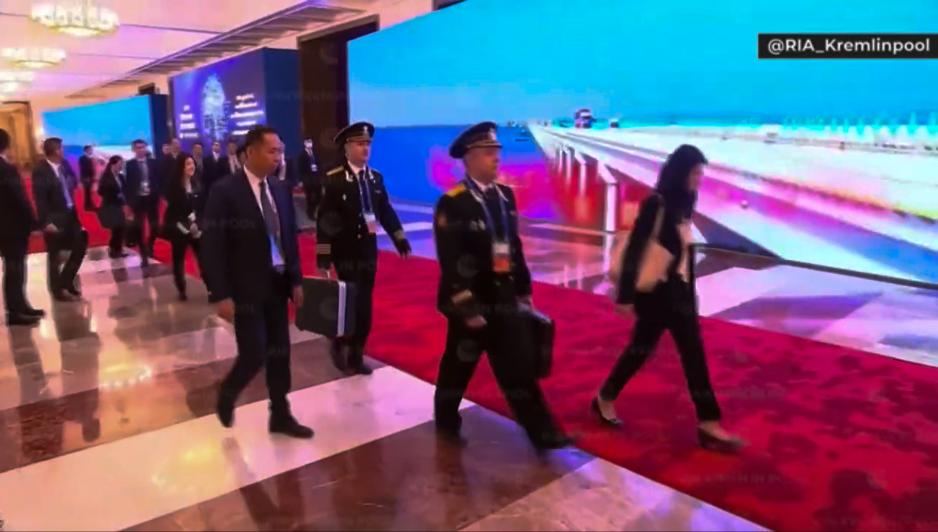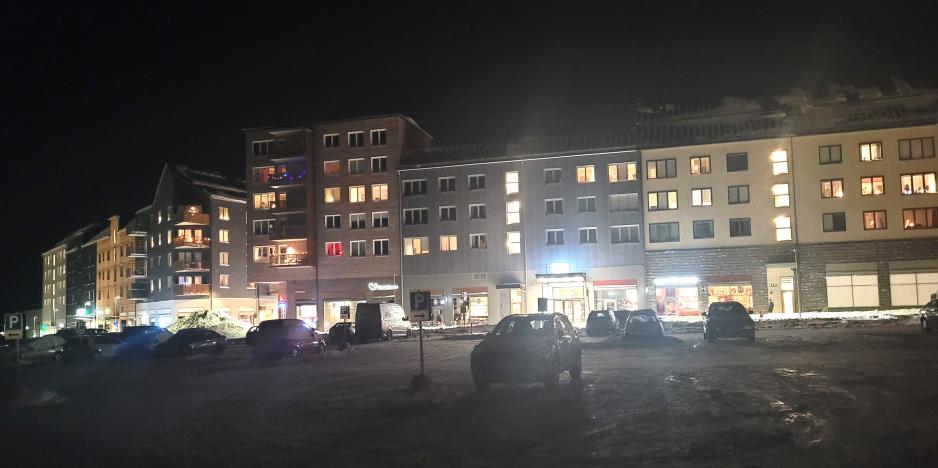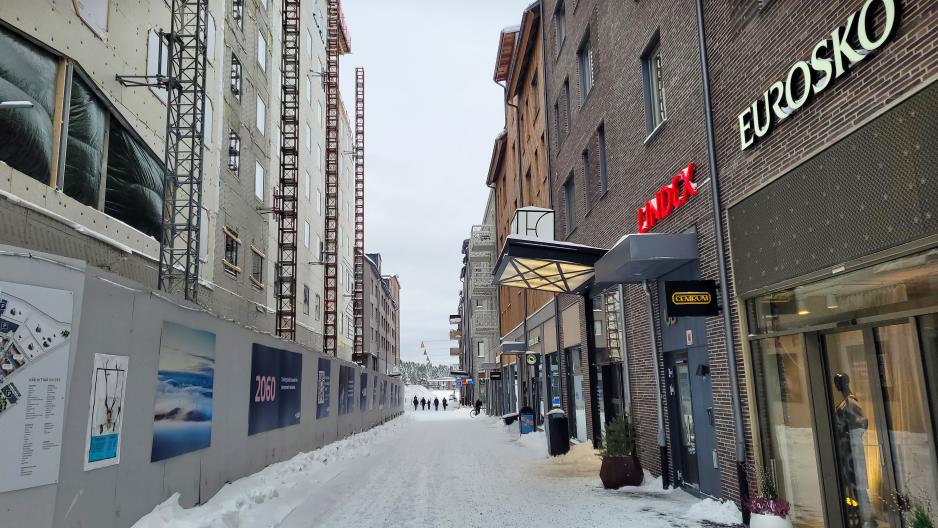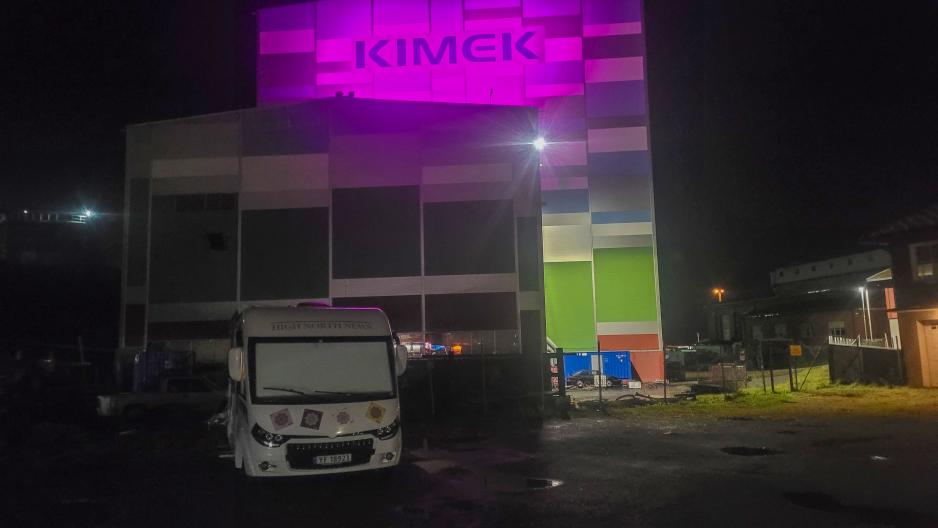High North Tour 2023: Perhaps More People Will Fathom the Severity of the Situation As Putin Displays His Nuclear Briefcase

Behind Putin comes naval officers with what is said to be nuclear briefcases. (Screenshot of video from the Russian state news agency RIA on X)
Commentary: The images of two Russian officers carrying the briefcases that could ignite a nuclear war have been etched into my brain as I drive along the border with Russia. The briefcase is in China with Vladimir Putin. The nuclear bombs are only a few kilometers away.
It is grotesque to think about how two dictators, the Russian president and China's powerful leader Xi Jinping, are currently sitting together around a briefcase with access to weapons that could initiate a worldwide Ragnarok.
Greetings from a despot
A gathering around a campfire that decides life and death.
Showcasing the briefcase is a conscious greeting from a despot at war with a neighboring country—a greeting to the rest of the world, including its neighbors.
We cannot change the geographical aspect. Yet, the question remains: what do we choose to do in the shadow of a raging war?
I have driven on icy winter roads throughout the Cap of the North for just over a week. First on the Norwegian side, then through Sweden and Finland, before I returned to Norway.
Such slow travel provides an entirely different understanding of distances than a plane journey, which is the chosen mode of travel for the Armed Forces and the health care system when they move between their homes in the South and their workplaces in the North.
A gathering around a campfire that decides life and death.
Because they do not live here, those who are to ensure preparedness in the North. They arrive in Kirkenes by plane in military uniforms or scrubs before returning to where they actually belong after a few workdays.
Great contrasts
The contrasts are great along the country roads.
In Kiruna, significant investments are made in the modernization of industry. The state iron ore giant LKAB is to be electrified, and the mine is to be expanded. While the old city center is being demolished, new high-rise buildings continue to be built in a completely new city center.
With a mix of private and public capital, the equivalent of at least five abandoned railways in Northern Norway is invested.

High-rise buildings are replacing the wooden buildings in Kiruna. (Photo: Arne O. Holm)
Population decline has been turned into growth and optimism.
The situation is the opposite on the Norwegian side of the border. The population is decreasing, and those who continue living in the North are getting older. These are the naked, brutal facts, even when the nuclear suitcase is on display.
We know all this.
We also know that the Norwegian security policy in the North is based on two different prerequisites.
One is the ability to fight an enemy if an attack occurs. Here, retired and active officers argue almost daily about our ability to defend ourselves in the North. I will leave that topic for now.

An entirely new city is under construction in Kiruna. (Photo: Arne O. Holm)
The ability to deter
The other is our ability to deter an enemy from attacking. Then it is no longer just about military capacity. It is also about the power found in civil society. The defense of Northern Norway can only function if it is surrounded by a well-functioning society.
Therefore, it is ultimately about the rest of the nation's understanding of the importance of a strong Northern Norway. Only if there is such an understanding is it possible to introduce measures that are more than piecemeal attempts to plug the population leak to the south.
If we are also to reverse the trend, which is absolutely necessary, a completely different understanding is required than today.
Perhaps it is time to ask the state to take a step back.
In an interview with High North News, Special Advisor Ingrid Vik describes the move from the North to the South as an existential crisis.
"Many likely feel that they are living in a more uncertain part of the world – without it being fully understood and recognized in the country at large," says Ingrid Vik.
That is a correct observation. Had this recognition been present, a lot could have been different.
Detached from reality
Now, the national effort is largely disconnected from the geopolitical reality.
The healthcare system in the North refuses to take into account considerations other than the medically profitable. Infrastructure development is calculated at best according to the same scale used in central Eastern Norway.
The salary funds in the public sector are used for high commuting management salaries, free housing, and an almost unlimited number of trips home.
In sum, the state measures have not worked.
That is due to a combination of lack of will and lack of understanding.
Perhaps it is time to ask the state to take a step back and leave more of the responsibility to us who live in the North.
Instead of meager state support schemes without any effect whatsoever, the state could make it attractive to live in the North by removing large parts of the income tax throughout Northern Norway.
Tax would provide immediate effect
That would provide a necessary and immediate effect.
The health sector and defense commuters would find it more attractive to move to the North rather than commute there. For the state, it would, in all likelihood, be a profitable project despite the loss of a few tax coins.
Removing the tax would be effective immediately.
Northern Norway will be able to attract the expertise it desperately needs. Expertise through tax reduction would consequently trigger innovation and business development in a way a state could never come close to achieving.
With a growing population, investing in your home will turn from a purely loss-making project to a profitable investment, as central areas in Norway have experienced over time.
A different tax regime will attract private capital in a completely different way than today, not least because the right expertise will follow the investments.
Our geographic location
This is not the first time I suggest tax as a measure. But such a drastic measure requires a national understanding of the security policy challenges in the north, being greater than in many decades, perhaps greater than ever.
It requires that we collectively consider the gravity of our geographical location. That the political agenda is lifted beyond stock speculation and incompetence.
It requires those who govern the country to recognize the gravity first described by the Defense Commission and then by the Total Preparedness Commission.

Parked outside Kimek in Kirkenes. (Photo: Arne O. Holm)
If it is too demanding, it is enough to look at Statistics Norway's population forecasts and compare these figures to the stated ambitions on behalf of us Northerners.
Meanwhile, the briefcase that can trigger nuclear weapons a few miles from the border with Finnmark is being carried around China's capital. As the crow flies, it is almost 6,000 kilometers from Beijing to Kirkenes.
Yet, the switch for activating nuclear weapons is only a few seconds away.



